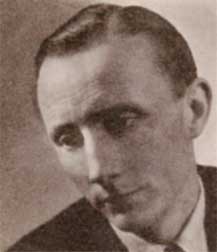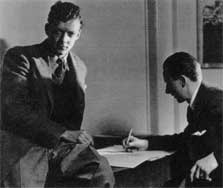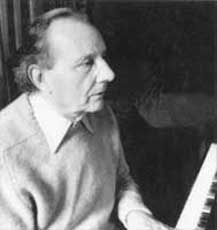|
|
LENNOX
BERKELEY : THE MAN AND HIS MUSIC
Lennox
Randall Francis Berkeley was born on the 12th May
1903 at Boars Hill, near Oxford, into an anglo-French
aristocratic family. Because of these strong French
connections he became bilingual and absorbed many
aspects of French culture. Berkeley's earliest musical
memories and influences at this time related to the
piano, as Berkeley himself remembered"....My father
was passionately fond of music, he hadn't been able
to learn music as a boy or hear very much music so
he acquired a pianola with all kinds of rolls of classical
|
 |
|
music,... Beethoven Sonatas and arrangements of concertos,...
which I heard at a very early age on this machine, that
was my introduction to music!" After attending Gresham's
school (the same school that W.H.Auden and Benjamin
Britten later attended.)、he then went up to Merton college,
Oxford in 1922 to read french and philology, but not
interestingly music!
|
|
|
After
leaving Oxford in 1926, as Berkeley himself later remembered
in an interview,"....I felt I really wanted to compose
music, it was one thing I could do or stood a chance
of getting anywhere with, but it was a bit difficult
to know how to start....I got an introduction to Ravel
who was staying in London with some friends I knew,
he was very kind to me and it was he who advised me
to go and work with Nadia Boulanger."During this time
He made other many influential and lasting associations
such as those of Stravinsky and Poulenc, the latter
becoming a lifelong friend.He also met members of "Les
six", (some of the French composers of this period),
such as Milhaud, Honegger, and Souguet.
|
 |
In 1935, Berkeley returned to London and it was shortly
afterwards (1936) he met Benjamin Britten,The two of
them then attended the 1936 ISCM (International society
of contemporary music) festival, their subsequent friendship
resulted in a rare musical collaboration, the orchestral
suite" Mon Juic"based on Catalan folk tunes. Berkeley
wrote the first two movements and Britten wrote the
last two movements, like Debussy and Ravel or Vaughan
Williams and Holst, their careers can both be followed
in tandem. Berkeley was later to observe"....We met
in Barcelona...it's
|
|
important to me because we became very close friends
and he had a great influence on me later....I was very
interested in his career because he was already a superb
technical musician and I could foresee what was coming."
As another critic (Desmond Shawe Taylor) was later to
say".... I think that really Benjamin Britten, although
such a strong musical personality, had in fact absorbed
something from that particular spare delicacy of lennox's
style and approach to music,....I think they probably
enriched each other."
During
the middle to late 1930's and throughout the 1940's
(World WarII) Lennox Berkeley's reputation grew steadily
as did his output, such as his Serenade for strings(1939),
First Symphony (1940) and Devertimento (1943). Apart
from the neo-classical works of Stravinsky and Britten,
the works of Ravel and Faure were particularly influential
in his music. Berkeley's personal voice was also strongly
influenced by Mozart and Chopin, his music was marked
by elegance, charm and masterly craftsmanship. In 1942,
He joined the staff of the B.B.C as an orchestral programme
planner, a position in which he brought a great deal
of artistic flair. it was while at the B.B.C that he
met his future wife, Elizabeth Freda Bernstein. He continued
in this position until 1945. In 1946 he took up a teaching
position at the Royal Academy of Music, among his pupils
were Richard Rodney Bennett, John Tavener and Malcolm
Williamson.
Berkeley
contributed to all musical genres, including four operas
and four symphonies. Among his finest achievements are
the "Four Poems of St Teresa of Avila"(1947) Stabat
Mater (1947), Piano Concerto in B flat (1948) "the First
Gentleman"(film music 1948), the Horn Trio (1953),and
the operas," A Dinner Engagement"(1954), and"Ruth" (1955).
An important part of this musical legacy are his liturgical
works, compositions relating to sacred texts, these
were greatly influenced by his conversion to Roman Catholicism
in (1928) and which had a profound effect on his life
and works. In one of his radio interviews, Berkeley
mentioned the importance of the religious sources of
his artistic inspirations"....Music does not speak to
the intellect alone, it's most important contact with
the listener is of another order for it belongs first
and foremost to the spiritual world and the best music
is that which communicates the most strongly and most
urgently on that level. One of his past pupils Malcolm
Williamson (later to become Master of the Queens music)
stated, "....Every work Berkeley wrote was religious
and that whatever the subject, Berkeley was like Palestrina
(Rennaisance composer) whom could not conceive of life
in no other terms rather than religious terms."The efficiency
of Lennox Berkeley's compositional and technical abilities
combined with his spiritual nuances come together to
produce something of an ethereal aspect in his music.
|
 |
In conclusion, the major body of Berkeley's musical output
was mainly between the 1940's and 1960's, and he received
a knighthood in 1974 in recognition for his services to
music. Lennox Berkeley died on the 26th December 1989,
at his memorial requiem mass at Westminster Cathedral
in March 1990, sir John Manduell in his memorial tribute
stated that"No British composer has written more distinctively
for the piano."
Kumiko
Ida August, 2005
|
|
|